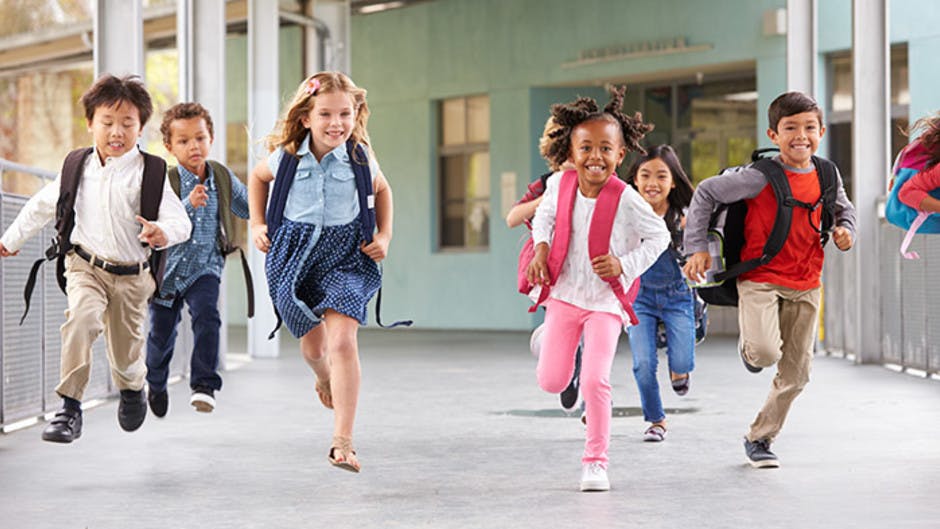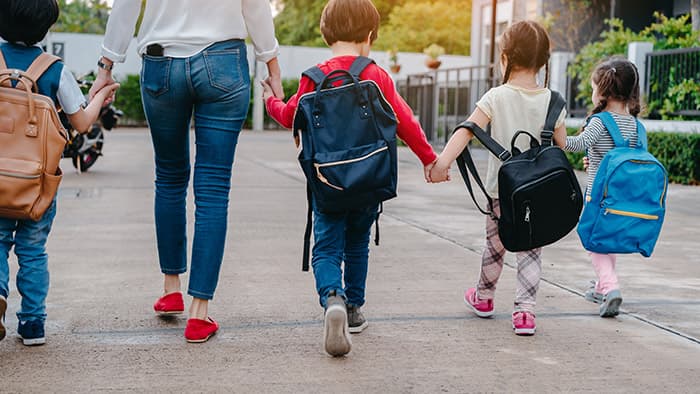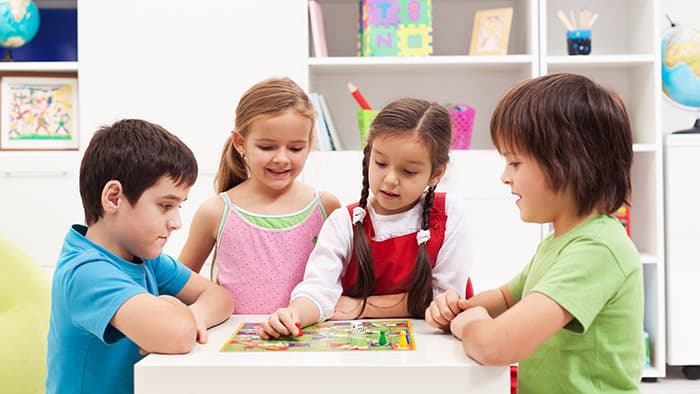


7 Tips to Prepare for the First Day of School

Prepare for the first day of school and get your child excited about learning with Reading Eggs. Explore hundreds of fun and exciting online reading activities and over 4000 e‑books to choose from. Free trial
If you've found yourself wondering how to prepare your child for the first day of school, you wouldn't be alone. The first day of school doesn't have to be a time of stress and anxiety. With a bit of preparation, you and your child will be ready to start school with confidence, ease and excitement.
If your little one suffers from back‑to‑school anxiety, you might also benefit from reading our article with strategies to build confidence and resilience: How to ease school anxiety and beat the back-to-school blues.
Or ease them into this transition by writing a simple social story about starting school.
You can also download our school readiness checklist here: School Readiness Pack.
Get ready for the first day of school with Reading Eggs!
Reading Eggs is the multi‑award winning programme that teaches children aged 3+ to learn how to read. With hundreds of self‑paced lessons and exciting games, Reading Eggs is a highly interactive and fun way to prepare your child not only for their first day of school but for years to come.
7 Tips to Prepare for the First Day of School
1. Visit the school with your child

Prepare for the first day of school and get your child excited about learning with Reading Eggs. Explore hundreds of fun and exciting online reading activities and over 4000 e‑books to choose from. Free trial
Before the first day of school comes around. Find out if your school runs an open day or tours of the buildings. If not, you can drive past the school with your child or even walk through the grounds after checking in with the administration office. This is a great way to get your child excited about beginning their journey in a brand‑new place. To add some fun and spark your little one's imagination, you can get them to draw a picture of what they remember or what they are looking forward to most about their first day of school.
2. Meet the teacher
Meeting the teacher is a helpful way to make your child's transition from your care into another's much easier. If they know who they will be spending each school day with from the get‑go, they are less likely to feel overwhelmed or upset. Before the meeting, ask your child if there are any questions they would like to ask their new teacher and encourage them to ask questions on their own.
3. Arrange play sessions

Prepare for the first day of school and get your child excited about learning with Reading Eggs. Explore hundreds of fun and exciting online reading activities and over 4000 e‑books to choose from. Free trial
Arrange play sessions with other children who will be starting school with your child. By seeing familiar faces and having already established some friendships, they will be less likely to feel alone and nervous on their first day of school.
4. Complete your school supplies checklist
Instead of feeling overwhelmed the night before, prepare a few days in advance to tick off all the school supplies you'll need. These include things like a pencil case, crayons, erasers, pencil sharpener and child‑safe scissors. Lunch essentials include things like a durable lunch box, plastic drink bottles with non‑drip caps, and food for packed lunches. Don't forget to label everything with your child's name.
Check out our handy Back-to-School Checklist.
5. Practise putting things in their bag
Before their first day of school, your child should know how to put things into their school bag, or at least feel comfortable asking their teacher for help. Other ways you can improve your child's independence before starting school is by helping them to practise putting on their shoes, eating and drinking without help, going to the toilet on their own and using a tissue to blow their nose.
6. Play board games and practise taking turns

Prepare for the first day of school and get your child excited about learning with Reading Eggs. Explore hundreds of fun and exciting online reading activities and over 4000 e‑books to choose from. Free trial
Children need to understand to take turns, especially when they're about to be put into a situation with a larger group of children. Playing board games with the whole family or with other children is a great way to encourage your child to wait patiently and understand the concept of fairness. Try these travel games for kids while they're on summer break.
7. Set a daily routine
Daily routines can help children understand what they need to do, when to do it each day and why it's important. To help prepare your child for their first day of school, get them into a routine which includes going to bed early, waking up at a certain time and eating a healthy breakfast. Before your child starts school, make sure you talk to them about what to expect. Remember to be flexible, as it may take some time for them to understand their new routine and adjust comfortably.
Remember, practice makes perfect! Try going through some essential learning skills with your child before their first day of school to help them feel confident.
To practise grammar skills, go here for 5 fun grammar games for kids:
To practise learning the alphabet try these games:
And to give them a head start with maths try these games:
For more first day of school tips, check out these articles as well:
Get ready for the first day of school with Reading Eggs!
Reading Eggs is the multi‑award winning programme that teaches children aged 3+ to learn how to read. With hundreds of self‑paced lessons and exciting games, Reading Eggs is a highly interactive and fun way to prepare your child not only for their first day of school but for years to come.






